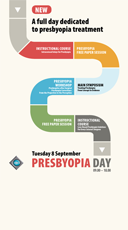Posters
(results will display both Free Papers & Poster)
Minimally invasive glaucoma surgery by XEN45® implant in a patient with congenital aniridia: a case report
Poster Details
First Author: J.Paz Moreno-Arrones SPAIN
Co Author(s): M. Teus Teus
Abstract Details
Purpose:
Male, 47 years old with congenital aniridia derived from a primary hospital for assessment of glaucoma surgery in his left eye (LE). Visual acuity in his right eye (RE) was light perception, and in LE was 0.05. Intraocular pressure (IOP) was 10 mmHg in RE and 30 mmHg in LE under treatment with two tablets of Edemox®, and topical eyedrops of Combinan® and Ganfort®, difficult to assess due to nystagmus and corneal epitelial dystrophy.
Setting:
Service of Ophthalmology, Principe De Asturias, University Hospital
Methods:
In addition, anterior segment examination revealed aphakia in RE and nuclear cataract in LE. A minimally invasive glaucoma surgery was performed by implanting a XEN45® device with mitomycin C 0.1% 30 minutes prior surgery. The day after surgery IOP was 16 mmHg with a superior nasal functioning bleb shown by OCT-Visante®, remaining stable during postop evolution, being 18 mmHg six months after op.
Results:
Congenital aniridia is an entity whose pattern of inheritance is mostly autosomal dominant (high penetrance and variable expressivity) but also recessive, and may be sporadic or familial. It is estimated to affect 1 / 60,000-100,000 new born.
Conclusions:
Affected eyes (always bilateral) of congenital aniridia, have a high incidence of infant-juvenile glaucoma, alterations at corneal epithelium (primary limbal insufficiency) and foveal hypoplasia. Congenital aniridia leads to visual disability of these patients. Due to preferential preservation of the limbus in aniridic eyes, minimally invasive glaucoma surgery as XEN45® device may be effective in controlling IOP in these cases.
Financial Disclosure:
NONE





